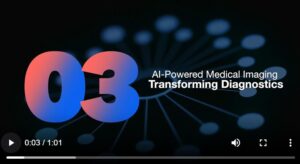#3 AI-Powered Medical Imaging Transforming Diagnostics

Artificial intelligence (AI) is revolutionizing medical imaging by improving accuracy, speed, and diagnostic capability. By analyzing complex data from MRI, X-ray, and CT scans, AI systems can identify patterns and detect abnormalities with greater precision than traditional methods. This advancement is reshaping diagnostics across healthcare, with a significant impact on breast imaging.
One of AI’s most notable applications is in breast cancer detection. Early diagnosis is crucial for better patient outcomes, and AI has significantly improved the ability to detect early-stage cancer. Traditional breast imaging methods, like mammography, rely on radiologists who may face challenges such as human error or difficulty interpreting dense breast tissue. AI addresses these issues by offering a more consistent and accurate analysis of breast images, detecting subtle patterns like microcalcifications and asymmetries that the human eye may miss.
By identifying these small markers early, AI allows for timely intervention and better treatment options. Additionally, it reduces false positives, which can lead to unnecessary biopsies and stress for patients. This improvement enhances diagnostic accuracy and streamlines healthcare, improving patient experience and reducing system burdens.
Beyond breast imaging, AI is making strides in other areas of healthcare. In cardiovascular imaging, AI accurately detects heart disease and blockages in coronary arteries. It can also analyze large datasets to assess the risk of future cardiovascular events, guiding preventive measures. In neurology, AI helps detect early signs of degenerative diseases like Alzheimer’s by identifying subtle changes in brain scans before symptoms appear.
AI also improves prenatal care by providing enhanced analysis of fetal ultrasounds, which helps monitor fetal development more accurately. Early detection of abnormalities can lead to better outcomes for both mother and baby.
Another significant benefit of AI in medical imaging is its ability to reduce disparities in healthcare. Traditional imaging methods may be less effective for certain racial and ethnic populations due to biological differences. However, AI systems trained on diverse datasets offer more accurate diagnoses across a broader range of patients, helping to close gaps in healthcare equity.
As AI advances, its medical imaging applications will only expand. Future innovations will likely involve more sophisticated algorithms capable of analyzing complex imaging data and supporting personalized and precise treatments. These advances promise to revolutionize healthcare, paving the way for a new era of precision medicine and early disease detection.
AI is transforming medical imaging by improving diagnostic accuracy, speed, and accessibility. From breast cancer detection to cardiovascular and neurological health, AI enhances patient outcomes and reduces healthcare disparities. As the technology evolves, it offers the potential for even greater benefits, shaping a future where early diagnosis and personalized care become standard practice.
